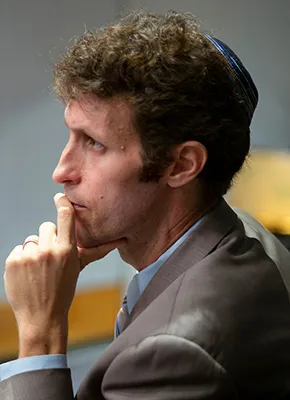Rabbi Sharon Kleinbaum on Resisting Anti-Semitism
Bringing together students, staff, faculty, and members of the local community, the College recently hosted the symposium Resisting Anti-Semitism: Past and Present, Local and Global, fostering dialogue on how to respond to and fight against anti-Jewish sentiments.
The event dissected the issue of anti-Semitism by engaging with experts, advancing discussion, and providing support for Jewish community members while also exploring solutions to end hatred of Jews.
One of the highlights was keynote speaker Rabbi Sharon Kleinbaum, who offered hopeful remarks about how to resist anti-Semitism. Kleinbaum is the spiritual leader of Congregation Beit Simchat Torah (CBST) in New York and has been ranked by Newsweek as one of the 50 most influential rabbis in America. She is recognized for transforming CBST into one of the most progressive Jewish congregations, which advocates for justice and equality for all sexual orientations and gender identities.
Kleinbaum presented her insights into overcoming anti-Semitism by sharing stories about times she engaged with those who are dissimilar and instances when she had to challenge her own perspective. She stressed the power of both solidarity and conversation.
“Breaking the narratives of hate is essential,” Kleinbaum said. “Nothing replaces being engaged with people we disagree with. We are creating a world of silos, and a world in which people are afraid to be around people who bring up other ideas.”
While Kleinbaum’s speech was the culminating feature of the symposium, it was only one component of an event that fostered dialogue surrounding anti-Semitism and explored how each individual can be part of the solution.

Rabbi Michael Ramberg, one of the event's co-organizers, envisioned the symposium as a way of reaching out to the Jewish members of the Swarthmore community.
The symposium consisted of three panels that analyzed how anti-Semitism unfolds in different regions of the world, including the U.S., Europe, the Middle East, and North Africa. The panelists discussed how the current political climate has affected the way people understand prejudice and violence and addressed how the community can respond to hateful actions moving forward.
Jason Wong ‘21, of Fremont, Calif., saw the symposium not as an event of answers, but a space for provoking thought and continuing dialogue.
“It was fascinating to learn about the different contexts in which anti-Semitism has materialized and continues to materialize, although I am left with more questions than answers,” says Wong.
Abigail Saul ’19, a Spanish and peace & conflict studies special major from Florham Park, N.J., who helped organize the event, viewed the symposium as a form of activism against anti-Semitism, and as an an opportunity for Swarthmore to continue to grow and support all members of the community.
“Part of resisting anti-Semitism is recognizing the full extent of our community and actively supporting all of our community members, no matter how they practice, what they look like, or where they come from,” says Saul. “That's what ‘Olam chesed yibaneh’ is all about––we will build this world with love, for all of us.”
The co-organizers of the event—Assistant Professor of Peace and Conflict Studies Sa’ed Atshan ’06 and Jewish Student Advisor Rabbi Michael Ramberg—also viewed the symposium as vital for the Swarthmore community. They felt it was an opportunity for the College to continue its mission of producing global and socially-concerned citizens, as anti-Semitism is an increasingly complex and globalized issue.
“Anti-Semitism is such an important issue in our world and we felt that we need to have conversations about it in the Swarthmore community, so we decided to be ambitious and organize this big conference, bringing together 10 incredibly distinguished speakers, and we made that dream come true,” says Atshan.
Ramberg stressed that, while the symposium engages with a global topic, anti-Semitism affects many faculty, staff, and students within our community. Therefore, the symposium is a way of reaching out to the Jewish members of the community to demonstrate that Swarthmore stands with them.
“Anything we can do to diminish hate and to show students on campus that we have so many people who are committed to understanding, but also to ending, to fighting, to resisting anti-Semitism,” says Ramberg.



